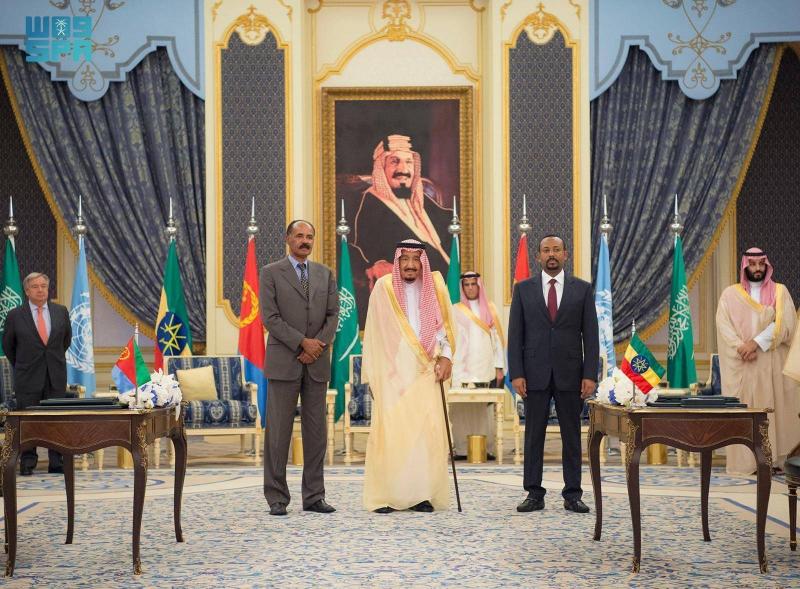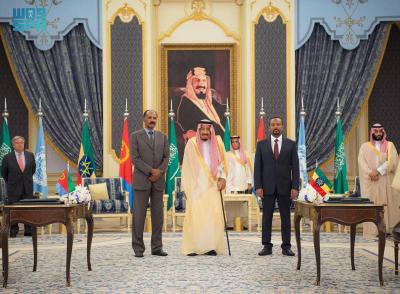The history of Saudi-African relations spans several decades, characterized by diverse connections and interactions across various aspects, filled with notable political, economic, and cultural positions. To document the relations between the Kingdom and the countries of the African continent due to its geopolitical significance, 16 joint committees, two coordination councils, and seven business councils have been established, in addition to the conclusion of over 250 cooperation agreements in various political, economic, and developmental fields.
The Kingdom plays a central role in supporting international and regional efforts aimed at establishing security and stability, resolving conflicts, combating terrorist groups, and enhancing the security capacities of African countries. In recognition of the responsibility toward Arab and African countries and concern for the interests of their peoples, Saudi Crown Prince Mohammed bin Salman has supported international and regional efforts to establish security and stability and resolve conflicts on the African continent, resulting in the historic Jeddah Agreement for Peace between Ethiopia and Eritrea. This support also led to the resumption of talks between the conflicting parties in Sudan, in Jeddah, aimed at reaching a political agreement that achieves security, stability, and prosperity for Sudan and its brotherly people, where the Kingdom hosted representatives from the Sudanese Armed Forces and the Support Forces in May 2023, encouraging both parties to engage seriously in the talks to achieve an effective short-term ceasefire, facilitate the delivery of emergency humanitarian aid, restore basic services and set a timeline for expanded negotiations to reach a permanent cessation of hostilities.
Concerned about the stability of African nations, the Kingdom expressed grave concern over the ongoing developments in the Republic of Niger and the Gabonese Republic and their implications for the security of the African continent and global peace, urging everyone to prioritize reason, wisdom, and the supreme national interests. The Kingdom also affirms its commitment to preserve the interests of the brotherly Libyan people and their national achievements and to achieve security, stability, and development in Libya.
### Development and Economy
In light of the Kingdom's pivotal role in driving development and the economy in African countries, the Prime Minister's commitment to supporting the economies of the continent has led the Public Investment Fund to launch several investment projects and activities in African countries in sectors such as energy, mining, telecommunications, and food, with a total of 15 billion Saudi Riyals, reaffirming the Prince's focus on the importance of continuing to seek new investment opportunities in Africa both directly and indirectly.
The Kingdom’s significant interest in the future of the African continent and its peoples was highlighted through the participation of the Crown Prince in the Paris summit addressing the challenge of Africa's funding shortage held in 2021. Economic relations between the Kingdom and African countries reached a total trade volume of 74.735 billion Saudi Riyals in 2023, with exports representing 53.071 billion Riyals, including metallic products, plastics and their products, fertilizers, and organic and inorganic chemical products, while imports totaled 21.664 billion Riyals, including metallic products, copper and its products, live animals, fruits, coffee, tea, and spices.
Given the Kingdom's special interest in the African continent, its total investments over the past ten years have reached 49.5 billion Riyals, with 47 Saudi companies operating in various sectors including renewable energy, food and beverage, business services, financial services, and consumer products.
### Comprehensive Sustainable Development
From its active and pioneering role in contributing to achieving comprehensive sustainable development, support from the Saudi Fund for Development for the African continent constituted approximately 57.06% of its total developmental activity worldwide, having provided its support to 46 developing countries in Africa through financing 413 developmental projects and programs, supporting developmental sectors via concessional loans totaling approximately 40.113.81 million Riyals. The developmental sectors financed by the fund include transport and communications (roads, ports, railways, airports), social infrastructure (education, health, water, sanitation, housing, urban development), agriculture, energy, and industry and mining, as well as international organizations.
### Humanitarian and Relief Aid
In the framework of its humanitarian and relief assistance to African countries, the Kingdom, under the guidance and supervision of the Custodian of the Two Holy Mosques and the Crown Prince, conducted humanitarian evacuations of 8,455 citizens and nationals from brotherly and friendly countries from the Republic of Sudan to safeguard their lives from the consequences of the armed conflict in Sudan.
As part of its humanitarian role, the value of Saudi aid provided to 54 countries in Africa, according to statistics from the King Salman Relief and Humanitarian Aid Center, amounts to $45,333,508,756, with the total number of implemented projects reaching 1,884, represented in developmental, voluntary humanitarian, charitable, and general humanitarian aid. Saudi assistance covers education, health, food security and agriculture, water and environmental sanitation, nutrition, logistics, shelter and non-food materials, security and protection, early recovery, and the support and coordination of humanitarian operations across multiple sectors.
### Cultural Relations
In a bid to strengthen cultural relations between both sides, statistics from the Ministry of Education reveal that there are 3,956 Saudi male and female students studying at African universities, while 23 Saudi government universities host 2,795 students representing 49 African countries. Confirming the strong ties between the Kingdom and African nations, several African countries supported Saudi Arabia’s request to host the Expo exhibition in Riyadh in 2030.
### Climate Change
To mitigate the impacts of climate change and major greenhouse gas emissions, the Crown Prince launched several initiatives, including the Middle East Green Initiative, which includes many African countries and aims to plant more than 50 billion trees and reduce over 10% of carbon emissions worldwide.
Saudi Arabia looks forward to the "Saudi-African Summit," set to take place tomorrow in Riyadh, to strengthen international efforts to find innovative solutions that help African countries exploit their own resources, maximizing the positive impact of Saudi investments and projects on the economies and communities of these countries, contributing to reducing unemployment and poverty, and enhancing the partnership between the Kingdom and Arab countries with the countries of the African continent.
This hosting reflects King Salman and Prince Mohammed bin Salman's commitment to developing Saudi Arabia's international partnerships, which serve its political, economic, and developmental goals and contribute to achieving the objectives of Vision 2030. The Kingdom seeks to enhance its relations with African countries and elevate them to broader horizons, establishing a fruitful partnership across various political, economic, and developmental fields.
This summit is an extension of the Kingdom's hosting of summits and ministerial meetings this year with several international blocs, including the Gulf summit with Central Asian countries, the Gulf summit with ASEAN member states, and the Arab ministerial meeting with Pacific countries, which have contributed to highlighting the Kingdom's leadership role on both the regional and international levels.




